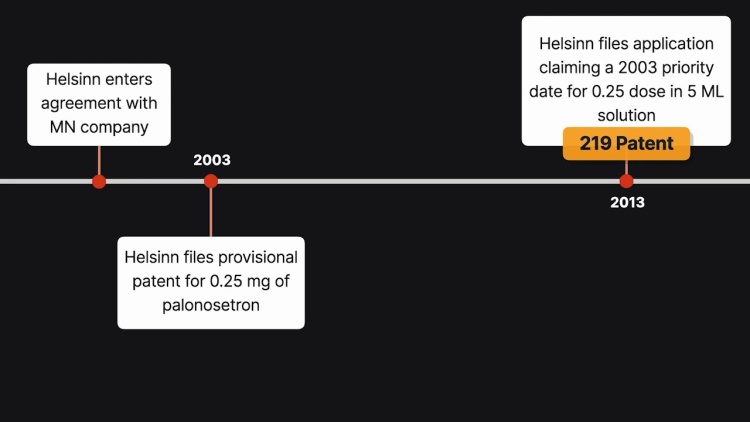Helsinn Healthcare S.A. v. Teva Pharmaceuticals USA, Inc.
United States Supreme Court
139 S.Ct. 628 (2019)
- Written by Rose VanHofwegen, JD
Facts
Helsinn Healthcare S.A. (plaintiff) makes Aloxi, a drug for chemotherapy nausea made from palonosetron. During clinical trials of .25 and .75 mg dosages, Helsinn contracted with a U.S. company to license and market any FDA-approved palonosetron product in the U.S. The contracts included dosage information but required confidentiality. Helsinn filed a provisional patent for those two dosages, followed by four applications claiming priority. The fourth, filed in 2013, covered a dose of .25 mg. Meanwhile, in 2011, Teva Pharmaceuticals USA, Inc. (defendant), sought FDA approval to market a generic equivalent of the .25 mg dose. When Helsinn sued Teva for patent infringement, Teva countered that Helsinn’s patent was not valid because the .25 mg dose was on sale more than a year before Helsinn filed its provisional application. The trial court ruled that the on-sale bar of the Leahy-Smith America Invents Act (AIA) did not apply because Helsinn’s supply and marketing agreements did not make the .25 mg dose available to the public, instead keeping it confidential. The Federal Circuit reversed, reasoning that public disclosure of the sale sufficed to apply the on-sale bar, even though the details of the dosage were kept confidential. The United States Supreme Court granted review.
Rule of Law
Issue
Holding and Reasoning (Thomas, J.)
What to do next…
Here's why 907,000 law students have relied on our case briefs:
- Written by law professors and practitioners, not other law students. 47,100 briefs, keyed to 996 casebooks. Top-notch customer support.
- The right amount of information, includes the facts, issues, rule of law, holding and reasoning, and any concurrences and dissents.
- Access in your classes, works on your mobile and tablet. Massive library of related video lessons and high quality multiple-choice questions.
- Easy to use, uniform format for every case brief. Written in plain English, not in legalese. Our briefs summarize and simplify; they don’t just repeat the court’s language.





